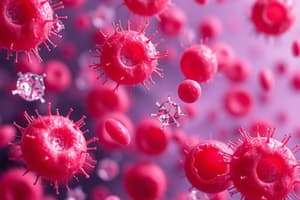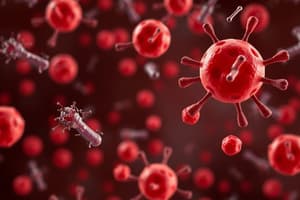Podcast
Questions and Answers
Which component makes up 44% of the centrifuged blood sample?
Which component makes up 44% of the centrifuged blood sample?
- Plasma
- Leukocytes
- Erythrocytes (correct)
- Platelets
Which leukocytes are classified as granulocytes?
Which leukocytes are classified as granulocytes?
- Monocytes
- Eosinophils
- Lymphocytes
- Neutrophils (correct)
What characterizes activated B-cells?
What characterizes activated B-cells?
- Production of histamine
- Differentiation into plasma cells (correct)
- Release of cytokines
- Phagocytosis
What is the main function of eosinophils?
What is the main function of eosinophils?
Which leukocytes are classified as non-phagocytes?
Which leukocytes are classified as non-phagocytes?
What is the composition of the middle gray-white layer in a centrifuged blood sample?
What is the composition of the middle gray-white layer in a centrifuged blood sample?
What is the percentage of granulocytes in normal peripheral blood?
What is the percentage of granulocytes in normal peripheral blood?
Which type of infections is associated with increased neutrophil count (neutrophilia)?
Which type of infections is associated with increased neutrophil count (neutrophilia)?
What is the primary function of eosinophils?
What is the primary function of eosinophils?
Which cells primarily release histamine and other chemicals involved in allergic reactions?
Which cells primarily release histamine and other chemicals involved in allergic reactions?
What is the main function of innate defenses in immunity?
What is the main function of innate defenses in immunity?
Where do B lymphocytes primarily originate?
Where do B lymphocytes primarily originate?
What is the function of activated B lymphocytes in the immune response?
What is the function of activated B lymphocytes in the immune response?
Which type of immunoglobulin is responsible for allergic reactions and histamine release?
Which type of immunoglobulin is responsible for allergic reactions and histamine release?
What is the function of basophils in the immune response?
What is the function of basophils in the immune response?
Which leukocytes are involved in the adaptive immune response?
Which leukocytes are involved in the adaptive immune response?
What is the main function of natural killer cells in the immune system?
What is the main function of natural killer cells in the immune system?
Which leukocyte population is primarily responsible for engulfing and destroying pathogens by phagocytosis?
Which leukocyte population is primarily responsible for engulfing and destroying pathogens by phagocytosis?
What is the primary role of monocytes in the immune system?
What is the primary role of monocytes in the immune system?
Which leukocyte population is primarily responsible for combating parasitic infections?
Which leukocyte population is primarily responsible for combating parasitic infections?
What characterizes activated T-cells in the immune response?
What characterizes activated T-cells in the immune response?
What is the primary function of dendritic cells in the immune system?
What is the primary function of dendritic cells in the immune system?
What is the main function of plasma cells in the immune response?
What is the main function of plasma cells in the immune response?
Which leukocyte population is primarily responsible for promoting inflammation by releasing histamine and other mediators?
Which leukocyte population is primarily responsible for promoting inflammation by releasing histamine and other mediators?
What is the primary function of macrophages in the immune system?
What is the primary function of macrophages in the immune system?
What is the primary function of neutrophils in the immune system?
What is the primary function of neutrophils in the immune system?
Which leukocyte population is primarily responsible for combating viral infections?
Which leukocyte population is primarily responsible for combating viral infections?
What is the main function of plasma cells in the immune response?
What is the main function of plasma cells in the immune response?
Which leukocytes are classified as agranulocytes?
Which leukocytes are classified as agranulocytes?
What is the primary function of dendritic cells in the immune system?
What is the primary function of dendritic cells in the immune system?
Which component makes up the majority of the centrifuged blood sample?
Which component makes up the majority of the centrifuged blood sample?
What is the primary role of monocytes in the immune system?
What is the primary role of monocytes in the immune system?
What is the main function of eosinophils?
What is the main function of eosinophils?
What characterizes activated B-cells?
What characterizes activated B-cells?
Where do B lymphocytes primarily originate?
Where do B lymphocytes primarily originate?
What is the main function of macrophages in the immune system?
What is the main function of macrophages in the immune system?
What is the primary function of innate defenses in immunity?
What is the primary function of innate defenses in immunity?
Flashcards are hidden until you start studying



